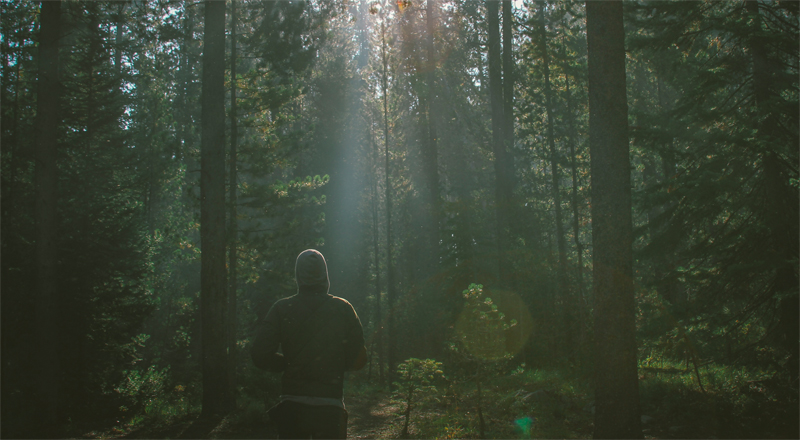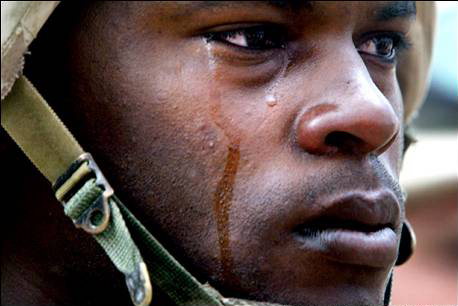by Midnight Freemason Contributor
Bro. Erik Marks
Veterans are vital in our fraternity. Many of whom live with PTSD in addition to other conditions due to, or in addition to, military service. Our fraternity is also home to many men and their spouses or family members who live with the same or similar disorders, whether or not they served in the military or experienced combat. As masons, with these people in our ranks or related to us, I believe we have an obligation to consider how we choose to serve them. It is essential for us as speculative masons to understand conditions which exist, but are not visible to the physical presentation. We need to be conscious and intentional about our offer relief, charity, and hope—and if we choose to do so, to discuss openly how we go about offering aid.
Trauma reactions, not just disorders such as PTSD, are part of the human condition. Though people have trauma reactions to natural disasters, in those situations it happens less frequently. Stress disorders of the kind I write are almost always related to man-made atrocities and cruelties. In a natural disaster, it is a shared experience and no malice is ascribed to the weather or earth for what happened. “Acts of nature,” are generally not experienced as targeting a particular person or group so the prevalence of trauma disorders is generally lower. With human created destruction, our psyches attempt to make meaning of what happened.
Humans make meaning of everything. Meaning making is one of the capacities upon which freemasonry is predicated. We have the innate ability to “model” situations in our minds, to put ourselves in someone else’s shoes, to create and use symbols through abstraction. We are capable of ascribing and understanding symbolic or conceptual meanings of things, communication, actions. Language and money are the most obvious examples of this type of symbolic representation in the world. You are reading little marking on a virtual page and through our shared symbolic understanding of these can receive my thoughts and then you begin to figure out what you think about my ideas. We become stressed by actual activities; however, as human’s we can become stressed, anxious, simply by thinking, modeling, the activities in our minds. We have a stress response, just to the idea. People can and do experience stress, anxiety, and/or panic by considering a future interaction. This example is still minimal compared to the potential psychological damage incurred in the face of combat.
A more recent body of knowledge, observation, and study, pertains to Moral-injuries, which can precipitate conditions such as and related to PTSD. In work with veterans, I’ve been introduced to research published in the American Psychological Association’s journal regarding Moral injury, PTSD, suicidal ideation, that are aided by social connectedness and self-compassion training.
Most people have some kind of a stress response to a terrifying and/or life-threatening situation. When people are involved in the creation of the threat, the humans placed in danger or threatened have a stress response that is mediated by the meaning they make of the situation. Important to note is that not all people who experience or witness a traumatic event will have reactions that develop into a disorder. Most are fortunate enough not to experience what I describe below.
Field physicians began documenting “shell shock” in soldiers in and after the first world war. I’m sure it happened earlier, but maybe to a lesser extent. It may have increased with our technological capacity to inflict greater, faster, and remotely ordered damage. Further, as the meaning made of armed conflicts became more ambiguous in the last century, it became more difficult for many to psychologically “get behind,” or make positive meaning of, the conflicts, wars, in which they were ordered to engage. Starting in Vietnam, public treatment of returning veterans exacerbated the problem. Brother Robert G. Davis’ excellent work Understanding Manhood in America, accurately and clearly explains these cultural developments. Simultaneously, in the field of psychology, clinicians began to notice similar findings in combat veterans and people who have suffered abuses at the hands of others in non-combat and domestic settings.
For there to be a trauma reaction, there has to be a traumatic event. The reactions to the event, or events, are fairly well understood and predictable. I’ll list some of the symptoms of PTSD below, but will also add in other things people sometimes experience. Though they come from the Diagnostic and Statistical Manual, version 5, I’ll paraphrase a little and augment with signs and symptoms from my practice and experience (this is a partial list):
- Always being on guard
- Depression
- Anxiety
- Panic
- Easily startled
- Nightmares
- Intrusive memories
- No energy/motivation
- Hopelessness
- Memory problems
- Trouble concentrating
- Inability to focus
- Difficulty reading
- Isolating
- Thoughts of suicide
- Substance use
- Anger expression issues
- Emotion regulation
- Unpredictable mood
- Feeling worthless
I explain trauma reactions, and especially those for service people this: most people have a range of stress they know they can tolerate and usually live and operate within those limits. We take care of ourselves by avoiding situations that are overwhelming for the most part. Sometimes we work in a very stressful environment and more stress reduction is needed. Our military service people undergo training, basic and advanced, that simulates and stresses them in ways that approximate battle. These practices are designed to condition body and mind to work in the most extreme and life-threatening conditions; “war is hell.” And I know I have no idea what that is like. Elite personnel and units are pushed beyond beyond to be able to think clearly in the taxing contexts which they operate. As an analogy, I was once told that most people, even most athletes begin to feel failure mode at about forty percent depletion. That means sixty percent still remains. Navy Seals, Green Berets, and other elite forces, it was said, are pushed—physically and psychologically—to ten percent remaining. That’s fifty percent beyond when most humans feel like they have nothing left. And that’s “just” training…
With this type of instruction and conditioning, most can operate and fare somewhat well. But the human psyche is only so adaptable. As I said earlier, humans are meaning making beings. The reason the human mind is so incredibly difficult to model using computers is that we have layers of consciousness and self-referential and internal meaning making dialog that is shaped by our past experiences and things sometimes we can’t remember, even when pushed. We analyze and label using real and modeled data sets, which lead to very complicated self-other-world understandings. So, under the extreme conditions of battle and / or multiple tours, sometimes the psyche is necessarily overwhelmed. Not all show symptoms of experiencing extreme stress and distress; others do. There may be warning signs, there may not—their expression could be subtle and slow or could be could be sudden. People who are good at compartmentalizing or dissociate easily, may continue working, not knowing the damage is done. Some ignore the warning signs due to stigma inside the services about PTSD and similar disorders.
One of the first things we can do is learn more about what people go through following trauma. This does not mean clinical training. It just means getting an overview of what the person is experiencing. For some of you, this article will be considered enough, I encourage you to find more. Rather than re-tell you specific stories I’ve heard over the last thirty years, I’ll point you to two web sites of veterans stories in their own words: Veterans Voices-Story Corps and Veteran Voices: The Oral History Podcast.
People can and do donate funds to help assist people with trauma reactions cope with the internal and external realities. Some of the funds go to service providers who are trained to help. Others go directly to pay for essentials when someone cannot work and/or doesn’t have others to help. It may help to pay a brother’s dues. There are times when even making the request to relieve their dues is challenging. What is easy and commonplace for most of us may become very difficult or impossible for someone living with PTSD and related issues. Sometimes the simple act of typing the letter while a brother dictates is what is needed because our brother can’t make it happen himself. A ride to lodge. Help with shopping. Hanging out or going for a hike with him and the kids.
We can give our time and attention. Sometimes all someone needs is to be heard, understood, and believed without judgment. It can be profoundly helpful to be witnessed and hold the the pain together. Knowing that someone else in the world holds the knowledge of our pain with us decreases its weight, the burden on our soul. A complicating factor may be that some have had traumatic experiences prior to military service. Because of our male culture, we don’t talk much about these experiences. And yet, one of the effects of returning to lodge monthly or more is we build stronger bonds and greater trust. As we grow closer as brothers and better friends, it’s possible we will have the honor to be trusted with this information. Our obligation reminds us we keep each other’s personal information without disclosing unless keeping it secret creates legal or bigger problems.
Sometimes our brothers need more. The need for more could be for an indefinite amount of time. This is a topic my brother and I return to often: what does relief and charity look like when it isn’t simply about money; when charity is needed for years or decades? How do we organize? Our injured brother already doesn’t want to “be a burden.” I hear the phrase every week at least once. This is a conversation I hope all lodges will take up and contend with. If it hasn’t occurred already in your community, eventually, it will. I often have more questions than answers, I know we do the best we can. And if things go well, we ask ourselves and each other what more we can do or organize and share the relief effort(s). I learned recently that due to stigma in and out of the military, many veterans don’t seek services, may not realize services are available, or aren’t able to access services due to distance or capacity to get there. This is another way we are able to help: information and transportation.
Another way to help is to not diminish the pain or discredit the experience. As the pin says: “some wounds aren’t visible.” As men we have baked into our culture an abhorrence for “weakness.” The experience of a trauma reaction isn’t about weakness. It can befall any man, at any stage of life, even after a delay (i.e. PTSD following military combat, with delayed onset). If you hear others diminishing someone’s pain as being a personal weakness or some other such nonsense, I hope you will step in an clarify—especially if the person making the misinformed statement is a mason! Point them to this article or resources below. We inform ourselves to educate others and thereby reduce stigma. Taking action in these ways does so many a meaningful service, honoring their service, humanity, and our brotherhood.
Resources:
https://ptsdusa.org/
2020 GIIA Veterans Wellness Summit
VA or https://www.ptsd.va.gov/
VA treatment locator
NIMH
APA
Military Benefits
Relax Relax
Psych Today trauma treatment finder
The Traveling Ambassador
~EAM




